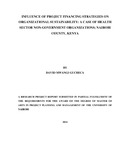| dc.description.abstract | Every organization exists to achieve certain goals and objectives but the achievement of these
goals and the sustainability of the organizations are dependents on several factors among them
resources availability. One of the greatest challenges facing nonprofit organizations is how to
sustain themselves and support their activities financially. According to the literature reviewed
NGOs are formulating different financing strategies not only because donors funding are
decreasing but also because donors are shifting their focus to new areas. The purpose of this
study was to examine the influence of projects financing strategies on organizational sustainability
with specific reference to health sector NGOs in Nairobi County. Literature reviewed indicated
that some of the financing strategies that organizations can adopt to enhance organizational
sustainability are revenues diversification, organizational costs management, building strategic
partnerships and maintenance of unrestricted funds. This study examined how revenues
diversification, organizational costs management, building strategic partnerships and
maintenance of unrestricted funds influence organizational sustainability. The sample size in
this study was determined through an approach based on Precision rate and Confidence level as
recommended by Kothari (2004). The formula resulted into 56 NGOs from a total population
237 NGOs. Two respondents finance and a programme staff were picked from each of the 56
NGOs resulting into a sample size of 112 respondents. The list of the 237 Nairobi based health
sector NGOs was provided by the National NGOs Co-ordination Board on August 18, 2014.
The research was conducted using a descriptive survey study. Questionnaires were used to
collect both quantitative and qualitative data. Quantitative data was analyzed using SPSS
software while qualitative data was analyzed through content analysis. The study found that
costs management contribute most to organization sustainability followed by strategic
partnership, revenue diversification and unrestricted fund in that order. The study also found
that the four independent variables that were studied, contribute (55.1%) only of the
organizational sustainability. The study recommends that to enhance sustainability the NGOs
should diversify their funding base and avoids dependency on any one source of revenue
whether internal or external. A balance between internally generated and externally generated
revenues is highly recommended. In addition cordial relationships with strategic partners are
critical as it can translate to more funding. Finally NGOs should hire competent Finance
Managers that are able to manage organizations finances competently and offer appropriate
advice to the management on financial matters. | en_US |

